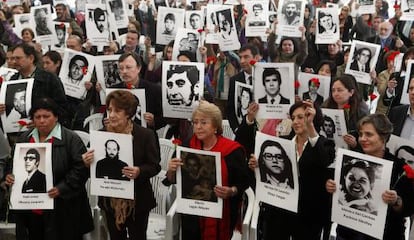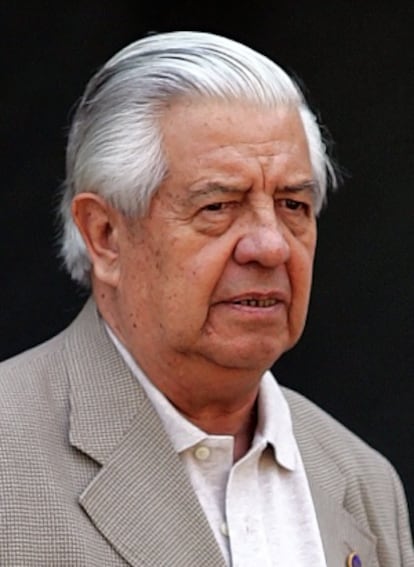Bachelet reveals she was interrogated by Chile’s notorious secret police chief
Ex-president in the race for second term contradicts former DINA chief Manuel Contreras claims she was never held during Pinochet dictatorship

With just over a month before the general elections in Chile, former President Michelle Bachelet revealed in a television interview that she had been interrogated during her youth by the notorious chief of the DINA secret police under the Pinochet dictatorship, Manuel Contreras.
Bachelet, who is considered the frontrunner in the November 17 presidential race, told CNN Chile that she was “deeply outraged” by Contreras’ recent statements that the former president was never held in the infamous Villa Grimaldi prison, as she has claimed.
Contreras is serving two life sentences at the Punta Peuco prison after he was convicted of the murders of some 1,500 opponents during the dictatorship of General Augusto Pinochet (1973-1990).
It is estimated that over 3,200 people were executed during this period, while a further 1,000 disappeared.
Villa Grimaldi, where around 4,500 opponents of the regime were held, was one of the main torture centers used by the DINA; at least 18 people were murdered there and the whereabouts of 211 remain unknown.
Before she fled into exile to Australia and later the former German Democratic Republic (GDR), Bachelet was held for two months along with her mother, Ángela Jeria, who was tortured at Villa Grimaldi.
“He personally interrogated me,” she said in the interview broadcast on Monday.
Bachelet, the former head of UN Women, was the daughter of a general, Alberto Bachelet Martínez, who was loyal to Marxist President Salvador Allende.

Pinochet’s forces overthrew Allende in a bloody coup on September 11, 1973. The president shot himself with an assault rifle after he was cornered in his office at La Moneda palace.
Bachelet’s father was held in prison and reportedly died of a heart attack in custody.
Contreras gave a series of interviews last month as part of a commemoration of the 40th anniversary of the coup. They took place at the Cordillera prison, where 10 other convicted former officers were held and given special privileges not afforded to other inmates, such as their own private rooms, televisions, computers, a library and a spa.
Contreras, 84, denied that he took part in abuses during the time he headed the DINA, from 1973 to 1977.
Following the interview, many victims and families expressed outrage at the special treatment he was being given, which forced President Sebastián Piñera to order the Cordillera camp’s closure and the transfer of the prisoners to Punta Peuco, where in all about 40 former officers are serving their sentences. Before Contreras was transferred, a fellow inmate, retired General Odlanier Mena, committed suicide at his home during a weekend furlough.
“I was never in agreement with places where inmates enjoy certain privileges,” Bachelet said.
When asked whether she agreed with the granting of presidential pardons to convicted officers on human rights abuses who are now ill, Bachelet said that those cases need to be individually analyzed.
Specifically asked about retired Colonel Marcelo Moren Brito, a former DINA agent who also interrogated Bachelet at Villa Grimaldi, she said that any eventual pardon would not be based on a personal grudge. “The most important thing – and this is something that I have to deeply analyze – is to look at what example we are giving to the country. I am not so clear on this.”
Tu suscripción se está usando en otro dispositivo
¿Quieres añadir otro usuario a tu suscripción?
Si continúas leyendo en este dispositivo, no se podrá leer en el otro.
FlechaTu suscripción se está usando en otro dispositivo y solo puedes acceder a EL PAÍS desde un dispositivo a la vez.
Si quieres compartir tu cuenta, cambia tu suscripción a la modalidad Premium, así podrás añadir otro usuario. Cada uno accederá con su propia cuenta de email, lo que os permitirá personalizar vuestra experiencia en EL PAÍS.
¿Tienes una suscripción de empresa? Accede aquí para contratar más cuentas.
En el caso de no saber quién está usando tu cuenta, te recomendamos cambiar tu contraseña aquí.
Si decides continuar compartiendo tu cuenta, este mensaje se mostrará en tu dispositivo y en el de la otra persona que está usando tu cuenta de forma indefinida, afectando a tu experiencia de lectura. Puedes consultar aquí los términos y condiciones de la suscripción digital.








































